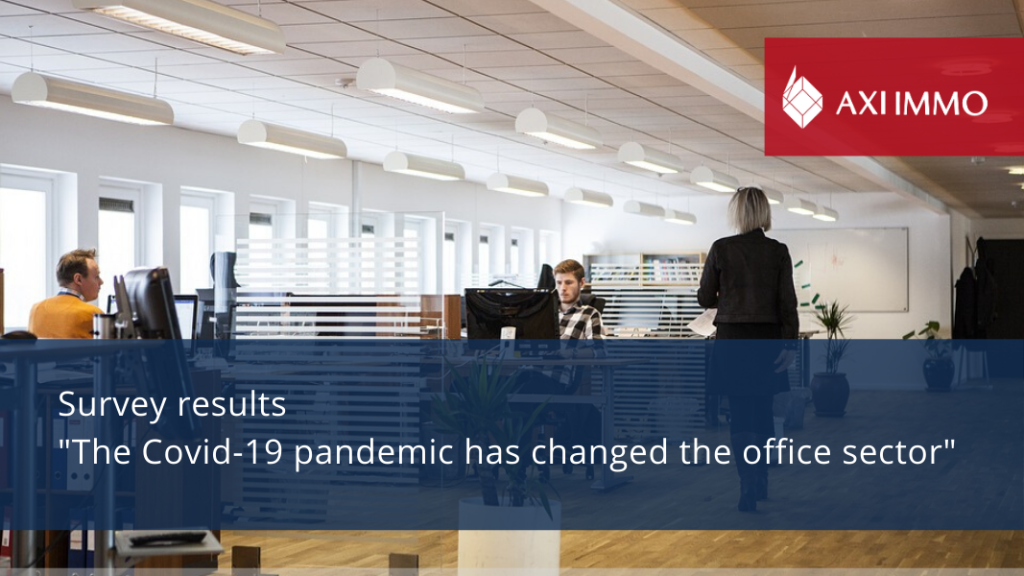The Covid-19 pandemic has changed the office sector
AXI IMMO survey results among office space tenants - Pandemia Covid-19 is changing the office market. What is the situation from the perspective of tenants?

The outbreak of the Covid-19 pandemic forced many companies to transition most of their staff to remote work. This shift took several days while a complete return to the office will take at least a few weeks. How have the occupiers’ responded to this situation and what are they planning post lockdown? To find out we surveyed 55 companies who currently lease office space.
Homes become offices
According to our survey of office occupiers, fewer than 20% of respondents had a policy of remote working for any part of their staff before the pandemic. The situation changed radically as a result of the lockdown – 73% of the companies we surveyed declared that more than 90% of their employees are currently working from home.
Occupiers shift priorities
– 57% of respondents stated that they are planning negotiate rental holidays and/or rent reductions. The economic slowdown is causing a shift in companies’ attitude towards the cost of office space. Increased financial discipline may result in less emphasis on creating attractive working environments aimed at attracting and retaining talent, with spending on fit-outs likely to drop. We expect a high number of renegotiations and relocations, with the latter focussed on cost cutting. This may increase the attractiveness of offices in non-central locations, such as Warsaw’s Mokotów district – says Martin Lipiński, Director of Office Space and Tenant Representation at AXI IMMO.
This is reflected in the results of our survey. Asked about key criteria when choosing office space, 72% of respondents selected location. However, an almost equal share – 67% – chose total occupation costs. Fit-outs aimed at increasing productivity came last, with only 14% of respondents selecting it as a key point of consideration.
What will office work be like after the lockdown?
– After a few weeks of home office we see that there is longing for the office environment but this is combined with a realisation that remote working can be effective. Due to new market conditions, the office real estate sector has gone through a rapid change. It is transitioning from being a tenant market up until March to gradually becoming a landlord market – adds Martin Lipiński.
As the economy re-opens, a growing number of companies are planning a gradual return to the office. However, guidelines related to personal protection and the rule to maintain a 1.5-metre distance between work stations will force offices to function on altered schedules, including altering workdays between home and office. As a result, new models of managing office space will be developed. The side effect may be an increase in the use of flexible office space. Indeed, 20% of respondents stated that they would be interested in conducting at least some of the work in coworking spaces instead of permanent offices in the future.
Working from home accelerated the development of audio and video conferencing. In the near future, we also expect progress in security systems, especially contactless solutions for entering and using office space. 66% of respondents confirmed, that changes in work systems forced by the pandemic accelerated the technological progress of their companies.
– The office will remain one of the most important elements of any company’s operations. However, the survey and our conversations with occupiers show that the office environment will change. The way in which employees use office space will be transformed; there will also be more need for advance planning of how the space is utilised. We will be analysing the ways in which organisations operate in order to best match office space to individual needs as well as new health and safety guidelines. Moreover, occupiers can expect more advanced smartphone applications. These could be used for booking conference rooms and setting air conditioning around the office. They may also be used for contacless entry to the building and lifts, with access codes sent to the phone. Applications could also inform us about safety levels in the office and remind us about maintaining necessary precautions. – concludes Martin Lipiński.
Methodology:
The advisory firm AXI IMMO conducted an online survey on the impact of Covid-19 on the office real estate sector between the 10th and 30th of March 2020. The respondents comprised company managers and department heads from 55 organisations that are occupiers of office space.
About AXI IMMO
AXI IMMO advises on the lease and management of warehouse and office space, as well as the purchase and sale of investment land. As part of the offer, the company provides B2B and B2C chain management services. AXI IMMO’s biggest advantage is the combination of international service standards with reliable knowledge of the local market. The company received the title of Best Local Agency of the Year in the years 2012 – 2019. It also received the title of Best Team in the warehouse sector in 2016-2017. The above titles were awarded in the prestigious CiJ Awards competition organized by the CEE CiJ Journal. The AXI IMMO analysis department conducts research and provides reports on the commercial real estate market.
Recent articles
14 April 2025
New Work expands in Warsaw with new serviced offices space at Metron building, AXI IMMO advises
Serviced offices at New Work in Warsaw, just steps away from Metro Wierzbno station.
9 April 2025
Central Poland Industrial Snapshot – Analysis of the industrial and logistics real estate market in Central Poland, AXI IMMO publication
High industrial take-up in Łódź region in 2024 driven by lease renewals
3 April 2025
AXI IMMO presents its analysis of the industrial & logistics market in Małopolska, southern Poland
Małopolska on developers' spotlight: more space for industrial and logistics on the horizon.
24 March 2025
Office market in Kraków 2024, Poland, publication by AXI IMMO, 2025 March – Analysis, trends, forecasts
Kraków is the leader of regional office markets – tenant activity is growing. AXI IMMO's special publication on Office market in Krakow in 2024, Poland includes an analysis of supply, demand, rental rates, as well as trends and forecasts on the Krakow office market in 2025 and 2026.



